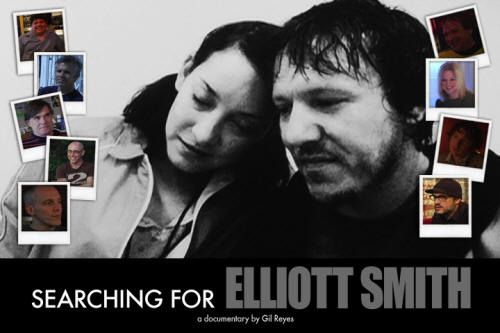|
You are reading the older HTML site
Positive Feedback ISSUE 61
Sonic Satori - Searching for Elliott
Smith, An Honest Labor of Love
Alexandra and I love Elliott Smith's music. We are also documentary addicts. I'd say, easily, over ninety percent of our household Netflix streams are documentaries. They have a killer selection if you don't already know about it. I highly recommend checking it out if you're a fellow doc hound. So naturally, when I found out we missed a screening of the soon-to-be-released Searching for Elliott Smith documentary in Long Beach (a mere forty-five minutes away) a few weeks ago I was crushed. I missed the chance the see an independent film about his life and work! I felt like a fair weather fan. It upset me so much I felt compelled to write a message straight from the gut to whomever would read it on the Searching for Elliott Smith Facebook page. A few hours later I get a call from Gil Reyes, Director of the film! This blew my mind. Gil told me that my "passion just jumped off the screen" and he offered to hand-deliver one of only two existing DVD videos of the film so we could watch it at home in our media room! I felt like I was living in a movie for a second. I mean, when does that ever happen? I believe in serendipity, but this was insane. As it turns out, Gil lives in Los Angeles and they had plenty of time before the next screening, which will take place in Denver at The Oriental on July 28th. He said he'd leave it with us for a week. Why is any of this important in the context of this review? You'll see. First: Gil Reyes turned out to be a very nice guy. We had never met before, but here he was, in my home, a mere two hours after we spoke for the first time in our lives. Like I said: Serendipity. He stayed for awhile as we (me, my wife Alexandra and Gil) got to know each other and spoke about Elliott Smiths music, and why Gil had chosen this project, bankrolling the whole thing himself. As it turns out, he was a fan of the music, but he wasn't a serious Elliott Smith devotee. That came later, as he spent time making the film (which I thought intriguing): The Director truly learns to love the subject of his film while he's embarking on its production. Again, what does all this have to do with the review of this film? After meeting the Director of Searching for Elliott Smith in my home with my wife, feeling like we could actually become friends—what if we hated the documentary? There was some added pressure there, I can't lie about that. However, I play, literally, at least a song of Smith's every work-day (if not a complete album). His music means that much to me. So I was hoping, obviously, to like the film very much. What a crazy conversation that would that have been, had I hated it! I would have felt like a jack ass, justifiably in my opinion. Thank God: We loved it. It felt like everything a good documentary should be. It seemed unbiased, I learned something new about an artist I've been a fan of for years, and it was captivating. Now; we don't claim to be authorities on documentary film-making and our fandom is not all about educating ourselves. After all, lets face it: Tons of documentaries are more entertaining than they are informative. I love docs because I believe the human condition, with all its varying characters and stories are far more entertaining than the very best fiction. As the late Harvey Pekar said in the brilliant American Splendor (another favorite flick in this house): "life is pretty complex stuff". The story of Elliott Smith's life, his art, the morose, intricate beauty of his music, and certainly the circumstances surrounding his death couldn't be better fit for a documentary. His story may have ended in tragedy, but he left a legacy of timeless music to be enjoyed for generations to come. Unfortunately, the breadth of that great body of work is perhaps equaled or even over-shadowed by the intensity of the mystery surrounding his death. Fans, close friends, and even the family have been tortured by the unanswered questions pertaining to the events leading up to the artists last night alive. At the core of these unanswered questions? Smith's fiancée/manager at time of his death: Jennifer Chiba. Despite writing about Smith's death for Hifi+ magazine years ago, I didn't have any specific information on those events, or on Jennifer Chiba. I did as much research as I could, but how can anybody know, aside of the people present at the time, about the whole truth behind Smith's death? Chiba was the only person there, and, after Elliott Smith stabbed himself in the heart, twice (yes, twice) she claimed she pulled the knife from his chest. Smith died two hours later after being rushed to a hospital in Los Angeles. Many people close to Smith immediately pointed the finger her way. They were living together at the time, and Chiba claimed that he injured himself while she was in the bathroom (again, none of this has been proven). When you have this many question marks, it's only natural to try and formulate your own opinion based on the information you're given. This is where Reyes direction shines: It seemingly focuses on the story itself and manages to appear neutral. Perhaps it took a person who wasn't a die hard Elliott Smith fan to try and tell this story unbiasedly. Reyes does a great job of telling the story of Smith's artistic evolution by stitching all sorts of various media and interviews together covering a wide range of Smith's career (even speaking with one of Smith's high school teachers). We get to see and hear about everything from his early days with his grunge band Heatmiser to his later solo work where he claimed he was happy without having to scream all the time. When asked during an interview why he was always screaming during his time with Heatmiser, Smith replied with a simple, yet poignant answer: "I thought that's what you needed to do, so I did it." You can tell he felt more at home writing songs using subtle, flowing melodies and laid-back harmonies (the magic formula that made him stick out, and therefore made him famous). You get to learn about his growing discontent with being recognized as his career progressed through more interview clips with the artist himself, as well as conversations with peers and good friends. We also hear from filmmaker Gus Van Sant, who worked with Smith on the Good Will Hunting soundtrack. The singer/songwriter earned an Academy Award nomination as the result of that collaboration for his famous song "Miss Misery". The sudden attention propelled Smith to instant stardom, and many believe this was also the beginning of his intense downward spiral into deep depression and drug abuse. Though many claim Smith was already prone to these feelings prior to his work on Good Will Hunting, fame seemed to catapult his despair. That story has a familiar ring to it (think Kurt Cobain).
If you listen to Smith's solo work you might arrive at the conclusion that he was a consistently gloomy person, but luckily, thanks to conversations with Smith's close friend and former roommate Sean Croghan you learn that Smith also knew how to have a good time, make fun of himself, and that he also had a fantastic sense of humor. This warmed my heart to hear this, as I also assumed he was always depressed due to the morose nature of many of his songs. You should never judge a book by it's cover right? Well, Searching for Elliott Smith attempts to open that cover and give the audience a deeper look into the life of the artist, a life that was filled (seemingly) with as much happiness as it was with darkness. I came away with a new outlook on Elliott Smith, and so I think the films achieves this goal. While I thought the movie was very balanced in its presentation of the artist's story, it was the Director's decision to seek out Jennifer Chiba (Smith's former manager and fiancée at the time of his death) for the documentary that unfortunately resulted in Elliott Smith's family refusing to be involved. There's been a swarm of controversy surrounding Chiba and her relationship with Smith since his untimely demise in October, 2003. The family can't be certain about the degree of Chiba's involvement, and I know I'd feel the same way if my family member had died. Emotional leanings aside, Reyes sought out to interview Chiba for the film. She had never spoken out about the events leading to Smith's death, which she witnessed, and I have to tip my hat to Reyes for this. I'm not airing on either side of this highly emotional subject, I'm merely saying I admire his objectivity and dedication to the story itself. His ability to put these heavy factors aside and chase the truth is what, in my opinion, great documentarians do. Not only did Reyes get Chiba to agree to go on camera, but he also managed to get her to speak about the horrific events that lead to Smith's gruesome death. She denies killing him; which is one of many theories out there, and the intensity of the interview scene with her is palpable. When I found out later that Chiba sued the estate of Elliott Smith for a portion of his earnings (something you learn at the end of the film) I must admit it left a bad taste in my mouth. That's irrelevant however, what matters is the fact that the film left such a heavy impression on me that my wife and I ended up in a conversation about it for hours after the film was finished. That's another amazing characteristic of solid documentary film-making: It should spark conversation and debate, while informing the audience of the chosen subject. Searching for Elliott Smith left me aching for more answers. Unfortunately those answers died with Smith, but with films like this and the albums he left behind, his art gets to live on for eternity. I think Reyes has every reason to be proud of this work. I believe it will stand the test of time. I can't wait for its official release. I know I'm going to purchase a copy. Check out the website for updates (http://searchingforelliottsmith.com/) and if the film comes to your hometown and you're a Smith fan, I think you owe it to yourself to check this out.
|


